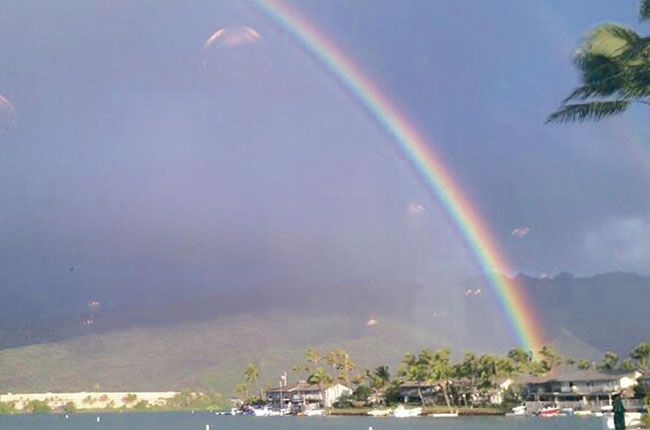Still Chasing Rainbows
Have you ever chased a rainbow? It’s something we all did as children with the hope of either catching one or finding a pot of gold at the end of it. And while most of us eventually outgrow our imaginations (parenthood and responsibilities tend to bring an end to many of our childhood fantasies), I continue to chase rainbows just as I did as a boy growing up on Kaua’i, and don’t plan to stop anytime soon.
We are especially blessed in Hawaii to see rainbows almost daily thanks to our tropical weather and constant sunshine. But despite my lifelong pursuit of that elusive pot of gold, I am fully aware that a rainbow is really only an optical illusion that appears when sunlight is refracted through raindrops.
When the light of the sun shines on the raindrops and passes through them, it takes the form of a colorful arc. Those colors – red, orange, yellow, green, blue, indigo and violet – are reflected back to us. In a double rainbow, a second arc is seen outside the main one and has the order of its colors reversed.
This second rainbow is caused by light reflecting twice inside water droplets.
In order to see one, you have to be between the sun and the rain because rainbows caused by sunlight always appear in the sky directly opposite the sun.
In other words, you can never physically catch a rainbow or find the end of one because when you move, so does the rainbow. Frankly, I’m not discouraged by science. I’m convinced I’ll catch one someday, and I get the feeling my youngest son feels the same way.
I was reminded of this last week during a drive home from school. As a gentle mist fell on those of us sitting in traffic, a magnificent double rainbow formed over Manoa. I pulled over to take a picture. (I always do when I see a rainbow.) My son said, “Dad, I think we can catch this one!”
I believed.
The rainbow kept pace as we exited the H-1 freeway and continued up the Pali. I knew what was happening. It was basic science: The sun was at our backs and the rain continued to fall. But I kept pursuing.
I shared my son’s excitement as he stared out the window.
“Can we get under it or go through it?” he asked.
“I’ll try!”
But just as I accelerated, the sun slipped behind some clouds and the col-orful phenomenon slowly dissipated and then disappeared.
“Aww, it’s gone.” “Next time,” I told him.
He quietly went back to his iPhone and I smiled. “Next time.”
Rainbows, or anuenue, the Hawaiian word for rainbows, have long symbolized different things around the world. In old Hawaii, a rainbow in the sky was a sign that an ali’i was nearby. Rainbows also have been a symbol of a new beginning, prosperity and good fortune.
For Buddhists, the rainbow is the highest state achievable before reaching Nirvana. But it’s not all positive. In ancestral Japan, rainbows were sometimes considered omens of bad luck because they represented snakes.
As for myself, rainbows have always given me a sense of hope. It amazes me how light can enter a droplet of water and create such a wonderful work of art. This gift from Mother Nature has the power to make you pause and soak in the beauty of nature
I may never catch a rainbow or find that pot of gold, but I’ll never stop hoping. My youngest son still believes, and I’ll never stop believing either.






